 Tìm kiếm
Tìm kiếm
Chương XIII Bộ luật Dân sự 2005: Các hình thức sở hữu
| Số hiệu: | 33/2005/QH11 | Loại văn bản: | Luật |
| Nơi ban hành: | Quốc hội | Người ký: | Nguyễn Văn An |
| Ngày ban hành: | 14/06/2005 | Ngày hiệu lực: | 01/01/2006 |
| Ngày công báo: | 01/09/2005 | Số công báo: | Từ số 1 đến số 3 |
| Lĩnh vực: | Quyền dân sự | Tình trạng: |
Hết hiệu lực
01/01/2017 |
TÓM TẮT VĂN BẢN
Ngày 14/6/2005, Quốc hội đã thông qua Bộ luật Dân sự số 33/2005/QH11, gồm 36 chương và 777 điều, có hiệu lực kể từ ngày 01/01/2006, thay thế cho Bộ luật Dân sự ban hành năm 1995 và Pháp lệnh Hợp đồng kinh tế năm 1989.
Bộ luật quy định: người từ đủ 06 tuổi đến chưa đủ 18 tuổi khi xác lập, thực hiện giao dịch dân sự phải được người đại diện theo pháp luật đồng ý, trừ giao dịch nhằm phục vụ nhu cầu sinh hoạt hàng ngày phù hợp với lứa tuổi hoặc pháp luật có quy định khác.
Trong trường hợp người từ đủ 15 tuổi đến chưa đủ 18 tuổi có tài sản riêng bảo đảm thực hiện nghĩa vụ thì có thể tự mình xác lập, thực hiện giao dịch dân sự mà không cần phải có sự đồng ý của người đại diện theo pháp luật, trừ trường hợp pháp luật có quy định khác...
Bộ luật coi Giao dịch dân sự thông qua phương tiện điện tử dưới hình thức thông điệp dữ liệu được coi là giao dịch bằng văn bản...
Trong trường hợp tài sản của nhiều chủ sở hữu khác nhau được sáp nhập với nhau tạo thành vật không chia được và không thể xác định tài sản đem sáp nhập là vật chính hoặc vật phụ thì vật mới được tạo thành là tài sản thuộc sở hữu chung của các chủ sở hữu đó, nếu tài sản đem sáp nhập là vật chính và vật phụ thì vật mới được tạo thành thuộc chủ sở hữu vật chính, kể từ thời điểm vật mới được tạo thành, chủ sở hữu tài sản mới phải thanh toán cho chủ sở hữu vật phụ phần giá trị của vật phụ đó, nếu không có thoả thuận khác...
Đối với di sản thừa kế, khi phân chia di sản nếu có người thừa kế cùng hàng đã thành thai nhưng chưa sinh ra thì phải dành lại một phần di sản bằng phần mà người thừa kế khác được hưởng, để nếu người thừa kế đó còn sống khi sinh ra, được hưởng, nếu chết trước khi sinh ra thì những người thừa kế khác được hưởng.
Những người thừa kế có quyền yêu cầu phân chia di sản bằng hiện vật, nếu không thể chia đều bằng hiện vật thì những người thừa kế có thể thoả thuận về việc định giá hiện vật và thoả thuận về người nhận hiện vật, nếu không thoả thuận được thì hiện vật được bán để chia...
Về quyền sử dụng đất, khi thời hạn cho thuê quyền sử dụng đất đang còn, bên cho thuê vẫn có quyền chuyển nhượng quyền sử dụng đất cho người khác nếu được cơ quan nhà nước có thẩm quyền cho phép, nhưng phải báo cho bên thuê biết để bên thuê thực hiện nghĩa vụ với bên nhận chuyển nhượng quyền sử dụng đất...
Một điểm mới của Bộ luật là quy định cá nhân có quyền xác định lại giới tính. Việc xác định lại giới tính được thực hiện trong trường hợp giới tính của người đó bị khuyết tật bẩm sinh hoặc chưa định hình chính xác mà cần có sự can thiệp của y học...
Bộ luật Dân sự 2005 thay thế Bộ luật Dân sự 1995, nhưng hiện đã hết hiệu lực và bị thay thế cho Bộ luật Dân sự 2015.
Văn bản tiếng việt
Văn bản tiếng anh
Tài sản thuộc hình thức sở hữu nhà nước bao gồm đất đai, rừng tự nhiên, rừng trồng có nguồn vốn từ ngân sách nhà nước, núi, sông hồ, nguồn nước, tài nguyên trong lòng đất, nguồn lợi tự nhiên ở vùng biển, thềm lục địa và vùng trời, phần vốn và tài sản do Nhà nước đầu tư vào doanh nghiệp, công trình thuộc các ngành và lĩnh vực kinh tế, văn hoá, xã hội, khoa học, kỹ thuật, ngoại giao, quốc phòng, an ninh cùng các tài sản khác do pháp luật quy định.
1. Nhà nước Cộng hoà xã hội chủ nghĩa Việt Nam thực hiện quyền của chủ sở hữu đối với tài sản thuộc hình thức sở hữu nhà nước.
2. Chính phủ thống nhất quản lý và bảo đảm sử dụng đúng mục đích, hiệu quả và tiết kiệm tài sản thuộc hình thức sở hữu nhà nước.
Việc quản lý, sử dụng, định đoạt tài sản thuộc hình thức sở hữu nhà nước được thực hiện trong phạm vi và theo trình tự do pháp luật quy định.
1. Khi tài sản thuộc hình thức sở hữu nhà nước được đầu tư vào doanh nghiệp nhà nước thì Nhà nước thực hiện quyền của chủ sở hữu đối với tài sản đó theo quy định của pháp luật về doanh nghiệp.
2. Doanh nghiệp nhà nước có quyền quản lý, sử dụng vốn, đất đai, tài nguyên và các tài sản khác do Nhà nước đầu tư theo quy định của pháp luật về doanh nghiệp.
1. Khi tài sản thuộc hình thức sở hữu nhà nước được giao cho cơ quan nhà nước, đơn vị vũ trang thì Nhà nước thực hiện quyền kiểm tra, giám sát việc quản lý, sử dụng tài sản đó.
2. Cơ quan nhà nước, đơn vị vũ trang có quyền quản lý, sử dụng đúng mục đích, theo quy định của pháp luật đối với tài sản được Nhà nước giao.
1. Khi tài sản thuộc hình thức sở hữu nhà nước được giao cho tổ chức chính trị, tổ chức chính trị - xã hội, tổ chức chính trị xã hội - nghề nghiệp thì Nhà nước thực hiện quyền kiểm tra, giám sát việc quản lý, sử dụng tài sản đó.
2. Tổ chức chính trị, tổ chức chính trị - xã hội, tổ chức chính trị xã hội - nghề nghiệp có quyền quản lý, sử dụng tài sản được Nhà nước giao đúng mục đích, phạm vi, theo cách thức, trình tự do pháp luật quy định phù hợp với chức năng, nhiệm vụ được quy định trong điều lệ.
Trong trường hợp pháp luật có quy định và được cơ quan nhà nước có thẩm quyền cho phép, doanh nghiệp, hộ gia đình, tổ hợp tác và cá nhân được sử dụng đất, khai thác nguồn lợi thủy sản và tài nguyên khác thuộc hình thức sở hữu nhà nước và phải sử dụng, khai thác đúng mục đích, có hiệu quả, thực hiện đầy đủ nghĩa vụ đối với Nhà nước theo quy định của pháp luật.
Đối với tài sản thuộc hình thức sở hữu nhà nước mà chưa được giao cho tổ chức, cá nhân quản lý thì Chính phủ tổ chức thực hiện việc bảo vệ, điều tra, khảo sát và lập quy hoạch đưa vào khai thác.
Sở hữu tập thể là sở hữu của hợp tác xã hoặc các hình thức kinh tế tập thể ổn định khác do cá nhân, hộ gia đình cùng góp vốn, góp sức hợp tác sản xuất, kinh doanh nhằm thực hiện mục đích chung được quy định trong điều lệ, theo nguyên tắc tự nguyện, bình đẳng, dân chủ, cùng quản lý và cùng hưởng lợi.
Tài sản được hình thành từ nguồn đóng góp của các thành viên, thu nhập hợp pháp do sản xuất, kinh doanh, được Nhà nước hỗ trợ hoặc từ các nguồn khác phù hợp với quy định của pháp luật là tài sản thuộc sở hữu của tập thể đó.
1. Việc chiếm hữu, sử dụng và định đoạt tài sản thuộc hình thức sở hữu tập thể phải tuân theo pháp luật, phù hợp với điều lệ của tập thể đó, bảo đảm sự phát triển ổn định của sở hữu tập thể.
2. Tài sản thuộc hình thức sở hữu tập thể được giao cho các thành viên khai thác công dụng bằng sức lao động của mình trong hoạt động sản xuất, kinh doanh nhằm phục vụ nhu cầu mở rộng sản xuất, phát triển kinh tế chung và lợi ích, nhu cầu của các thành viên.
3. Thành viên của tập thể có quyền được ưu tiên mua, thuê, thuê khoán tài sản thuộc hình thức sở hữu tập thể.
Sở hữu tư nhân là sở hữu của cá nhân đối với tài sản hợp pháp của mình.
Sở hữu tư nhân bao gồm sở hữu cá thể, sở hữu tiểu chủ, sở hữu tư bản tư nhân.
1. Thu nhập hợp pháp, của cải để dành, nhà ở, tư liệu sinh hoạt, tư liệu sản xuất, vốn, hoa lợi, lợi tức và các tài sản hợp pháp khác của cá nhân là tài sản thuộc hình thức sở hữu tư nhân.
Tài sản hợp pháp thuộc hình thức sở hữu tư nhân không bị hạn chế về số lượng, giá trị.
2. Cá nhân không được sở hữu đối với tài sản mà pháp luật quy định không thể thuộc hình thức sở hữu sở hữu tư nhân.
1. Cá nhân có quyền chiếm hữu, sử dụng, định đoạt tài sản thuộc sở hữu của mình nhằm phục vụ nhu cầu sinh hoạt, tiêu dùng hoặc sản xuất, kinh doanh và các mục đích khác phù hợp với quy định của pháp luật.
2. Việc chiếm hữu, sử dụng, định đoạt tài sản thuộc hình thức sở hữu tư nhân không được gây thiệt hại hoặc làm ảnh hưởng đến lợi ích của Nhà nước, lợi ích công cộng, quyền, lợi ích hợp pháp của người khác.
Sở hữu chung là sở hữu của nhiều chủ sở hữu đối với tài sản.
Sở hữu chung bao gồm sở hữu chung theo phần và sở hữu chung hợp nhất.
Tài sản thuộc hình thức sở hữu chung là tài sản chung.
Quyền sở hữu chung được xác lập theo thoả thuận của các chủ sở hữu, theo quy định của pháp luật hoặc theo tập quán.
1. Sở hữu chung theo phần là sở hữu chung mà trong đó phần quyền sở hữu của mỗi chủ sở hữu được xác định đối với tài sản chung.
2. Mỗi chủ sở hữu chung theo phần có quyền, nghĩa vụ đối với tài sản thuộc sở hữu chung tương ứng với phần quyền sở hữu của mình, trừ trường hợp có thoả thuận khác.
1. Sở hữu chung hợp nhất là sở hữu chung mà trong đó phần quyền sở hữu của mỗi chủ sở hữu chung không được xác định đối với tài sản chung.
Sở hữu chung hợp nhất bao gồm sở hữu chung hợp nhất có thể phân chia và sở hữu chung hợp nhất không phân chia.
2. Các chủ sở hữu chung hợp nhất có quyền, nghĩa vụ ngang nhau đối với tài sản thuộc sở hữu chung.
1. Sở hữu chung hỗn hợp là sở hữu đối với tài sản do các chủ sở hữu thuộc các thành phần kinh tế khác nhau góp vốn để sản xuất, kinh doanh thu lợi nhuận.
2. Tài sản được hình thành từ nguồn vốn góp của các chủ sở hữu, lợi nhuận hợp pháp thu được từ hoạt động sản xuất, kinh doanh hoặc từ các nguồn khác phù hợp với quy định của pháp luật là tài sản thuộc sở hữu chung hỗn hợp.
3. Việc chiếm hữu, sử dụng, định đoạt tài sản thuộc sở hữu chung hỗn hợp phải tuân theo quy định tại Điều 216 của Bộ luật này và các quy định của pháp luật có liên quan đến việc góp vốn, tổ chức, hoạt động sản xuất, kinh doanh, quản lý, điều hành, trách nhiệm về tài sản và phân chia lợi nhuận.
1. Sở hữu chung của vợ chồng là sở hữu chung hợp nhất.
2. Vợ chồng cùng nhau tạo lập, phát triển khối tài sản chung bằng công sức của mỗi người; có quyền ngang nhau trong việc chiếm hữu, sử dụng, định đoạt tài sản chung.
3. Vợ chồng cùng bàn bạc, thoả thuận hoặc ủy quyền cho nhau chiếm hữu, sử dụng, định đoạt tài sản chung.
4. Tài sản chung của vợ chồng có thể phân chia theo thoả thuận hoặc theo quyết định của Toà án.
1. Sở hữu chung của cộng đồng là sở hữu của dòng họ, thôn, ấp, làng, bản, buôn, sóc, cộng đồng tôn giáo và các cộng đồng dân cư khác đối với tài sản được hình thành theo tập quán, tài sản do các thành viên của cộng đồng cùng nhau đóng góp, quyên góp, được tặng cho chung hoặc từ các nguồn khác phù hợp với quy định của pháp luật nhằm mục đích thoả mãn lợi ích chung hợp pháp của cả cộng đồng.
2. Các thành viên của cộng đồng cùng quản lý, sử dụng, định đoạt tài sản chung theo thoả thuận hoặc theo tập quán, vì lợi ích của cộng đồng nhưng không được trái pháp luật, đạo đức xã hội.
3. Tài sản chung của cộng đồng là tài sản chung hợp nhất.
Các chủ sở hữu chung cùng quản lý tài sản chung theo nguyên tắc nhất trí, trừ trường hợp có thoả thuận khác hoặc pháp luật có quy định khác.
1. Mỗi chủ sở hữu chung theo phần có quyền khai thác công dụng, hưởng hoa lợi, lợi tức từ tài sản chung tương ứng với phần quyền sở hữu của mình, trừ trường hợp có thoả thuận khác hoặc pháp luật có quy định khác.
2. Các chủ sở hữu chung hợp nhất có quyền ngang nhau trong việc khai thác công dụng, hưởng hoa lợi, lợi tức từ tài sản chung, nếu không có thoả thuận khác.
1. Mỗi chủ sở hữu chung theo phần có quyền định đoạt phần quyền sở hữu của mình theo thoả thuận hoặc theo quy định của pháp luật.
2. Việc định đoạt tài sản chung hợp nhất được thực hiện theo thoả thuận của các chủ sở hữu chung hoặc theo quy định của pháp luật.
3. Trong trường hợp một chủ sở hữu chung bán phần quyền sở hữu của mình thì chủ sở hữu chung khác được quyền ưu tiên mua. Trong thời hạn ba tháng đối với tài sản chung là bất động sản, một tháng đối với tài sản chung là động sản, kể từ ngày các chủ sở hữu chung khác nhận được thông báo về việc bán và các điều kiện bán mà không có chủ sở hữu chung nào mua thì chủ sở hữu đó được quyền bán cho người khác.
Trong trường hợp bán phần quyền sở hữu mà có sự vi phạm về quyền ưu tiên mua thì trong thời hạn ba tháng, kể từ ngày phát hiện có sự vi phạm về quyền ưu tiên mua, chủ sở hữu chung theo phần trong số các chủ sở hữu chung có quyền yêu cầu Toà án chuyển sang cho mình quyền và nghĩa vụ của người mua; bên có lỗi gây thiệt hại phải bồi thường thiệt hại.
4. Trong trường hợp một trong các chủ sở hữu chung từ bỏ phần quyền sở hữu của mình hoặc khi người này chết mà không có người thừa kế thì phần quyền sở hữu đó thuộc Nhà nước, trừ trường hợp sở hữu chung của cộng đồng thì thuộc sở hữu chung của các chủ sở hữu chung còn lại.
1. Trong trường hợp sở hữu chung có thể phân chia thì mỗi chủ sở hữu chung đều có quyền yêu cầu chia tài sản chung; nếu các chủ sở hữu chung đã thoả thuận không phân chia tài sản chung trong một thời hạn thì mỗi chủ sở hữu chung chỉ có quyền yêu cầu chia tài sản chung khi hết thời hạn đó; khi tài sản chung không thể chia được bằng hiện vật thì được trị giá thành tiền để chia.
2. Trong trường hợp có người yêu cầu một người trong số các chủ sở hữu chung thực hiện nghĩa vụ thanh toán khi người đó không có tài sản riêng hoặc tài sản riêng không đủ để thanh toán thì người yêu cầu có quyền yêu cầu chia tài sản chung để nhận tiền thanh toán và được tham gia vào việc chia tài sản chung, trừ trường hợp pháp luật có quy định khác.
Nếu không thể chia phần quyền sở hữu bằng hiện vật hoặc việc chia này bị các chủ sở hữu chung còn lại phản đối thì người có quyền có quyền yêu cầu người có nghĩa vụ bán phần quyền sở hữu của mình để thực hiện nghĩa vụ thanh toán.
1. Phần diện tích, trang thiết bị dùng chung trong nhà chung cư thuộc sở hữu chung của tất cả chủ sở hữu các căn hộ trong nhà đó và không thể phân chia, trừ trường hợp pháp luật có quy định khác hoặc có sự thoả thuận của tất cả các chủ sở hữu.
2. Chủ sở hữu các căn hộ trong nhà chung cư có quyền và nghĩa vụ ngang nhau trong việc quản lý, sử dụng phần diện tích và thiết bị chung.
3. Trong trường hợp nhà chung cư bị tiêu hủy thì chủ sở hữu các căn hộ trong nhà chung cư có quyền sử dụng diện tích mặt đất của nhà chung cư theo quy định của pháp luật.
Sở hữu chung chấm dứt trong các trường hợp sau đây:
1. Tài sản chung đã được chia;
2. Một trong số các chủ sở hữu chung được hưởng toàn bộ tài sản chung;
3. Tài sản chung không còn;
4. Các trường hợp khác theo quy định của pháp luật.
Sở hữu của tổ chức chính trị, tổ chức chính trị - xã hội là sở hữu của tổ chức đó nhằm thực hiện mục đích chung quy định trong điều lệ.
1. Tài sản được hình thành từ nguồn đóng góp của các thành viên, tài sản được tặng cho chung và từ các nguồn khác phù hợp với quy định của pháp luật là tài sản thuộc sở hữu của tổ chức chính trị, tổ chức chính trị - xã hội.
Tài sản thuộc hình thức sở hữu nhà nước đã chuyển giao quyền sở hữu cho tổ chức chính trị, tổ chức chính trị - xã hội là tài sản thuộc sở hữu của tổ chức đó.
2. Tài sản thuộc hình thức sở hữu nhà nước giao cho tổ chức chính trị, tổ chức chính trị - xã hội để quản lý và sử dụng thì không thuộc sở hữu của tổ chức đó.
Tổ chức chính trị, tổ chức chính trị - xã hội thực hiện quyền chiếm hữu, sử dụng, định đoạt tài sản thuộc sở hữu của mình theo quy định của pháp luật và phù hợp với mục đích hoạt động được quy định trong điều lệ.
Sở hữu của tổ chức chính trị xã hội - nghề nghiệp, tổ chức xã hội, tổ chức xã hội - nghề nghiệp là sở hữu của cả tổ chức đó nhằm thực hiện mục đích chung của các thành viên được quy định trong điều lệ.
Tài sản được hình thành từ nguồn đóng góp của các thành viên, tài sản được tặng cho chung hoặc từ các nguồn khác phù hợp với quy định của pháp luật là tài sản thuộc sở hữu của tổ chức chính trị xã hội - nghề nghiệp, tổ chức xã hội, tổ chức xã hội - nghề nghiệp đó.
Tổ chức chính trị xã hội - nghề nghiệp, tổ chức xã hội, tổ chức xã hội - nghề nghiệp thực hiện quyền chiếm hữu, sử dụng, định đoạt tài sản thuộc sở hữu của mình theo quy định của pháp luật và phù hợp với mục đích hoạt động được quy định trong điều lệ.
Article 200.- Property under state ownership
Property under state ownership shall include land, natural forests, forests planted with the source of state budget capital, mountains, rivers, lakes, water sources, underground natural resources, resources from the sea, continental shelf and airspace, and the capital and property invested by the State in enterprises and facilities in the branches and fields of economy, culture, social affairs, science, technique, foreign affairs, national defense and security, and other properties specified by law.
Article 201.- Exercise of owner's rights to property under state ownership
1. The Socialist Republic of Vietnam State shall exercise owner's rights to property under state ownership.
2. The Government shall perform the unified management of the property under state ownership and ensure its efficient and thrifty use for the defined purposes.
Article 202.- Management, use and disposition of property under state ownership
The management, use and disposi-tion of property under state ownership shall be performed within the scope and according to the order specified by law.
Article 203.- Exercise of state ownership rights to property invested in state enterprises
1. When a property under state ownership is invested in a state enterprise, the State shall exercise owner's rights over such property in accordance with the provisions of law on enterprises.
2. State enterprises shall be entitled to manage and use capital, land, natural resources and other property invested by the State in accordance with the provisions of law on enterprises
Article 204.- Exercise of state ownership rights to property allocated to state agencies, armed force units
1. When the property under state ownership is assigned to state agencies or armed force units, the State shall exercise the right to inspect and supervise the management and use of such properties.
2. State agencies or armed force units shall have the right to manage and use the State-allocated property for the defined purposes and in accordance with the provisions of law.
Article 205.- Exercise of state ownership rights to property assigned to political organizations, socio-political organizations, socio-political-professional organizations
1. When the property under state ownership is allocated to political organizations, socio-political organizations or socio-political-professional organizations, the State shall exercise the right to inspect and supervise the management and use of such property.
2. Political organizations, socio-political organizations and socio-political-professional organizations shall have the rights to manage and use the State-allocated property for the defined purposes, according to the scope, mode and order provided for by law in accordance with the functions and tasks specified in their respective charters
Article 206.- Rights of enterprises, households, cooperative groups and individuals to use and exploit property under state ownership
In cases where it is so provided for by law and so permitted by competent state agencies, enterprises, households, cooperative groups or individuals may use land, exploit aquatic resources and other natural resources under state ownership and must use, exploit them efficiently and for the defined purposes, and fulfill their obligations towards the State in accordance with the provisions of law.
Article 207.- Property under state ownership which has not been allocated to organizations or individuals for management
The Government shall organize and exercise the protection, investigation and survey on, and work out plans to exploit the property under state ownership which has not been allocated to organizations or individuals for management.
Section 2. COLLECTIVE OWNERSHIP
Article 208.- Collective ownership
Collective ownership means ownership by cooperatives or other stable economic entities in which individuals and/or households jointly contribute capital and labor for production and business cooperation to achieve common goals stated in their charters and on the principles of voluntariness, equality, democracy and joint management and mutual benefit.
Article 209.- Property under collective ownership
Property constituted from the contributions of members, legitimate income from production and business, supports from the State or other sources that accord with the provisions of law shall be property under the ownership of such collectives.
Article 210.- Possession, use and disposition of property under collective ownership
1. The possession, use and disposition of property under collective ownership must comply with law, accord with the charters of the collectives and ensure the stable development of collective ownership.
2. Property under collective ownership may be assigned to members for exploitation of the utility thereof by their labor in production and business activities in order to serve the common need for production expansion and economic development as well as the interests and needs of the members.
3. The members of a collective shall have the pre-emptive right to purchase, lease or package- lease property under collective ownership.
Article 211.- Private ownership
Private ownership means ownership of individuals over their lawful property.
Private ownership comprises personal ownership by individuals, ownership by small business owners and private capitalist ownership.
Article 212.- Property under private ownership
1. Legitimate income, savings, residential houses, means of daily life, means of production, capital, yields and profits and other lawful properties of an individual constitute property under private ownership.
Lawful property under private ownership shall not be limited in quantity and value.
2. An individual cannot be the owner of a property which cannot, as provided for by law, come under private ownership.
Article 213.- Possession, use and disposition of property under private ownership
1. Individuals shall have the right to possession, use and disposition of property under their respective ownership to meet the needs of daily life, consumption or production and business and other purposes in accordance with the provisions of law.
2. The possession, use and disposition of property under private ownership must not cause damage to or affect State interests, public interests or legitimate rights and interests of other persons.
Article 214.- Common ownership
Common ownership means ownership of property by more than one owner.
Common ownership comprises common ownership by shares and common ownership by integration.
A property under common ownership is a common property.
Article 215.- Establishment of common ownership right
A common ownership right is established under the agreement of the owners, under the provisions of law or in accordance with practices.
Article 216.- Common ownership by shares
1. Common ownership by shares means common ownership in which each owner's share of the ownership right to the common property is determined.
2. Each of the owners of property under common ownership by shares shall have his/her rights and obligations to such property corresponding to his/her share of the ownership right, unless otherwise agreed upon.
Article 217.- Common ownership by integration
1. Common ownership by integration means common ownership in which each owner's share of the ownership right to the common property is not determined.
Common ownership by integration comprises divisible common ownership by integration and indivisible common ownership by integration.
2. Owners of property under common ownership by integration shall have equal rights and obligations to the property under common ownership.
Article 218.- Mixed common ownership
1. Mixed common ownership means ownership over the property contributed as capital by owners of different economic sectors for production and/or business to gain profits.
2. Property created from the sources of contributed capital of owners, lawful profits from production and/or business activities or from other sources in accordance with the provisions of law is the property under mixed common ownership.
3. The possession, use and disposition of property under mixed common ownership must comply with the provisions of Article 216 of this Code and relevant provisions of law on capital contribution, organization, production and/or business operation, management, administration, property liability and profit division.
Article 219.- Common ownership by husband and wife
1. Common ownership by husband and wife is common ownership by integration.
2. Husband and wife who jointly establish and develop the common property through the efforts of each shall have equal rights in the possession, use and disposition of such property.
3. Husband and wife shall discuss, agree or authorize each other to the possession, use and disposition of the common property.
4. The common property of husband and wife may be divided by their agreement or by a decision of the Court.
Article 220.- Common ownership by a community
1. Common ownership by a community means ownership by a family line, hamlet, village, mountain village, religious community or other population communities over the property estab-lished in accordance with practices and the property jointly contributed and raised by community members or given to the whole community or from other sources in accordance with the provisions of law for meeting the common legitimate interests of the entire community.
2. The members of a community shall jointly manage, use and dispose of the common property for the interests of the community as agreed upon or according to practices, but not in contravention of law and social ethics.
3. The common property of a community is the property under common ownership by integration.
Article 221.- Possession of common property
Owners of property under common ownership shall jointly manage the common property according to the principle of unanimity, unless otherwise agreed upon or provided for by law.
Article 222.- Use of common property
1. Each owner of property under common ownership by shares shall have the right to exploit the utility of, and enjoy the yields and profits from, the common property corresponding to his/her share in the ownership right, unless otherwise agreed upon or provided for by law.
2. Owners of property under common ownership by integration shall have equal rights to exploit the utility of, and enjoy the yields and profits from, the common property, unless otherwise agreed upon.
Article 223.- Disposition of common property
1. Each owner of property under common ownership by shares shall have the right to dispose of his/her own share in the ownership right as agreed upon or provided for by law.
2. The disposition of property under common ownership by integration shall be performed in accordance with the agreement of the co-owners or the provisions of law.
3. In cases where an owner of property under common ownership sells his/her share in the ownership right, the other co-owners shall have the pre-emptive right to purchase such share. If within three months from the date they are notified of the sale and conditions of the sale, for an immovable property or one month for a movable property none of the co-owners wants to buy it, then such owner shall have the right to sell his/her share to other persons.
In cases where the sale of ownership right shares violates the pre-emptive right to purchase, any of the co-owners of the property under common ownership by shares shall, within three months from the date of detecting the violation of the pre-emptive right to purchase, have the right to request the Court to transfer to him/her the rights and obligations of the purchaser; the party at fault in causing damage must pay compensation therefor.
4. In cases where one of the co-owners renounces his/her share in the ownership right or where such person dies without any heir(s), such share of the ownership right shall belong to the State, except for the case of common ownership by community where such share shall come under common ownership of the remaining co-owners.
Article 224.- Division of property under common ownership
1. In case of divisible common ownership, each co-owner shall have the right to request a division of the common property; if the co-owners have agreed not to divide the common property within a certain time limit, then each co-owner shall only have the right to demand a division of the common property after the expiration of that time limit; when the common property cannot be divided in kind, it should be valued in money for division.
2. In cases where a person requests one of the co-owners to discharge his/her payment obligations when the latter has no private property or his/her private property is not enough for payment, the requesting person shall have the right to request a division of the common property so as to receive monetary payment and to participate in the division of the common property, unless otherwise provided for by law.
If the ownership right share in kind cannot be divided or such division is protested against by the remaining co-owners, the requesting person shall have the right to request the obligator to sell his/her ownership right share for the performance of his/her payment obligations
Article 225.- Common ownership in a condominium
1. The areas, equipment and furnishings, which are for common use, in a condominium are under common ownership of all the apartment owners in that condominium and cannot be divided, unless otherwise provided for by law or otherwise agreed upon by all owners.
2. The apartment owners in a condominium shall have equal rights and obligations in the management and use of common areas and equipment.
3. In cases where a condominium is destroyed, the apartment owners in the condominium shall have the right to use the ground area of the condominium in accordance with the provisions of law.
Article 226.- Termination of common ownership
A common ownership shall terminate in the following cases:
1. The common property has been divided;
2. One of the co-owners is entitled to the entire common property;
3. The common property no longer exists;
4. Other cases specified by law.
Section 5. OWNERSHIP BY POLITICAL ORGANIZATIONS, SOCIO-POLITICAL ORGANIZATIONS
Article 227.- Ownership by political organizations, socio-political organizations
Ownership by political organizations or socio-political organizations means ownership by such organizations for the purpose of achieving the common objectives specified in their charters.
Article 228.- Property under ownership by political organizations, socio-political organizations
1. Property constituted from the sources of contributions of members, property donated or presented to the whole organizations and property from other sources in accordance with the provisions of law is the property under ownership by political organizations or socio-political organizations.
Property under state ownership, over which the ownership has been transferred to political organizations or socio-political organizations, shall be the property under ownership by such organizations.
2. Property under state ownership which has been assigned to political organizations or socio-political organizations for management and use shall not come under ownership by such organizations.
Article 229.- Possession, use, disposition of property under ownership by political organizations, socio-political organizations
Political organizations or socio-political organizations shall exercise the rights to possession, use and disposition of property under their respective ownership in accordance with the provisions of law and the operation purposes stipulated in their charters.
Section 6. OWNERSHIP BY SOCIO-POLITICAL-PROFESSIONAL ORGANIZATIONS, SOCIAL ORGANIZATIONS, SOCIO-PROFESSIONAL ORGANIZATIONS
Article 230.- Ownership by socio-political- professional organizations, social organizations, socio-professional organizations
Ownership by socio-political-professional organizations, social organizations or socio-professional organizations means ownership by such organizations for the purpose of achieving the common objectives of members as specified in their respective charters.
Article 231.- Property under ownership by socio-political-professional organizations, social organizations, socio-professional organizations
Property constituted from the sources of contributions by members, property donated or presented to the whole organizations or from other sources in accordance with the provisions of law shall be the property under ownership by such socio-political-professional organizations, social organizations or socio-professional organizations.
Article 232.- Possession, use, disposition of property under ownership by socio-political-professional organizations, social organizations, socio-professional organizations
Socio-political-professional organizations shall exercise their rights to possession, use, disposition of property under their respective ownership in accordance with the provisions of law and the operation purposes specified in their respective charters.
Cập nhật
Bài viết liên quan
Tài sản chung của vợ chồng được chia khi nào mới nhất 2025?
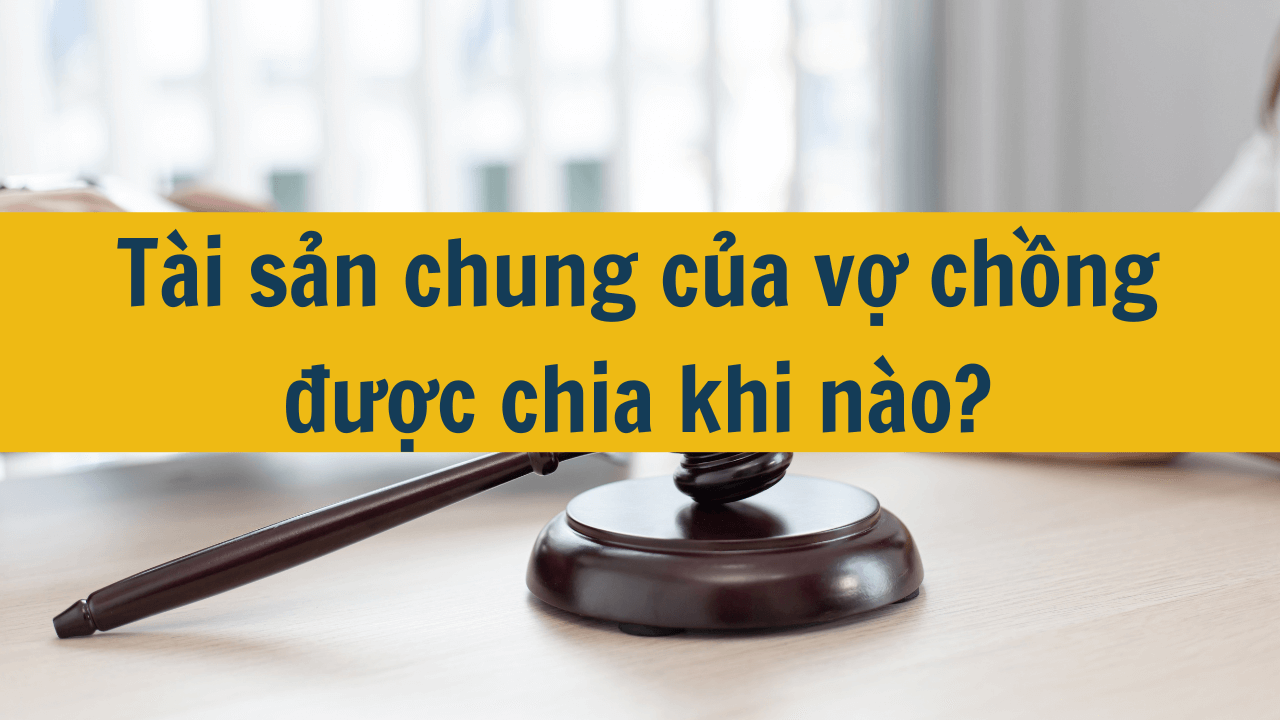
Tài sản chung của vợ chồng được chia khi nào mới nhất 2025?
Tài sản chung của vợ chồng được chia khi nào? Đây là câu hỏi phổ biến trong các vụ việc ly hôn hoặc tranh chấp tài sản. Việc xác định thời điểm và cách thức chia tài sản chung không chỉ dựa trên thỏa thuận giữa các bên mà còn phải tuân thủ quy định pháp luật. Trong bài viết này, chúng ta sẽ cùng tìm hiểu những trường hợp cụ thể khi tài sản chung của vợ chồng được chia và nguyên tắc pháp lý áp dụng. 31/12/2024Căn cứ xác lập tài sản chung của vợ chồng mới nhất 2025
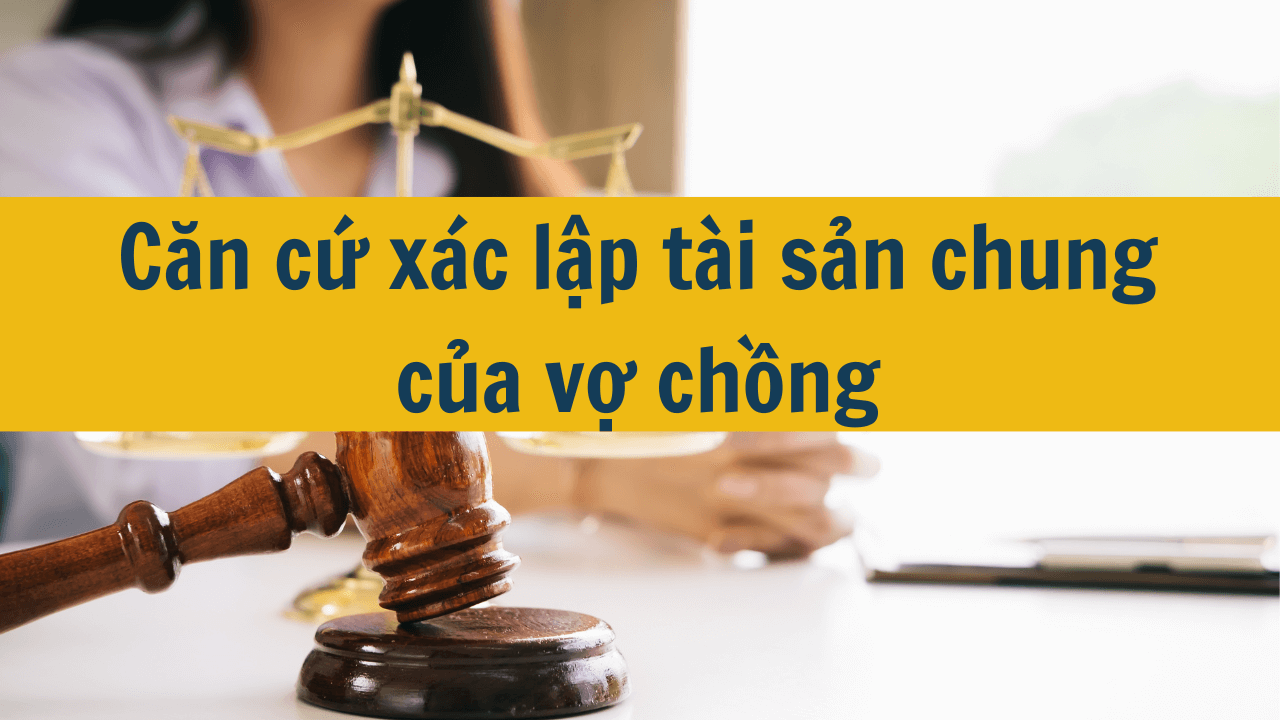
Căn cứ xác lập tài sản chung của vợ chồng mới nhất 2025
Tài sản chung của vợ chồng là vấn đề pháp lý quan trọng, ảnh hưởng trực tiếp đến quyền lợi và nghĩa vụ của cả hai bên trong hôn nhân. Vậy pháp luật quy định như thế nào về căn cứ xác lập tài sản chung? Bài viết này sẽ cung cấp thông tin chi tiết, rõ ràng và chuẩn pháp lý, giúp bạn hiểu rõ hơn về quyền sở hữu tài sản trong hôn nhân. 31/12/2024Trên Sổ đỏ có ghi tài sản chung, riêng vợ chồng không mới nhất 2025?
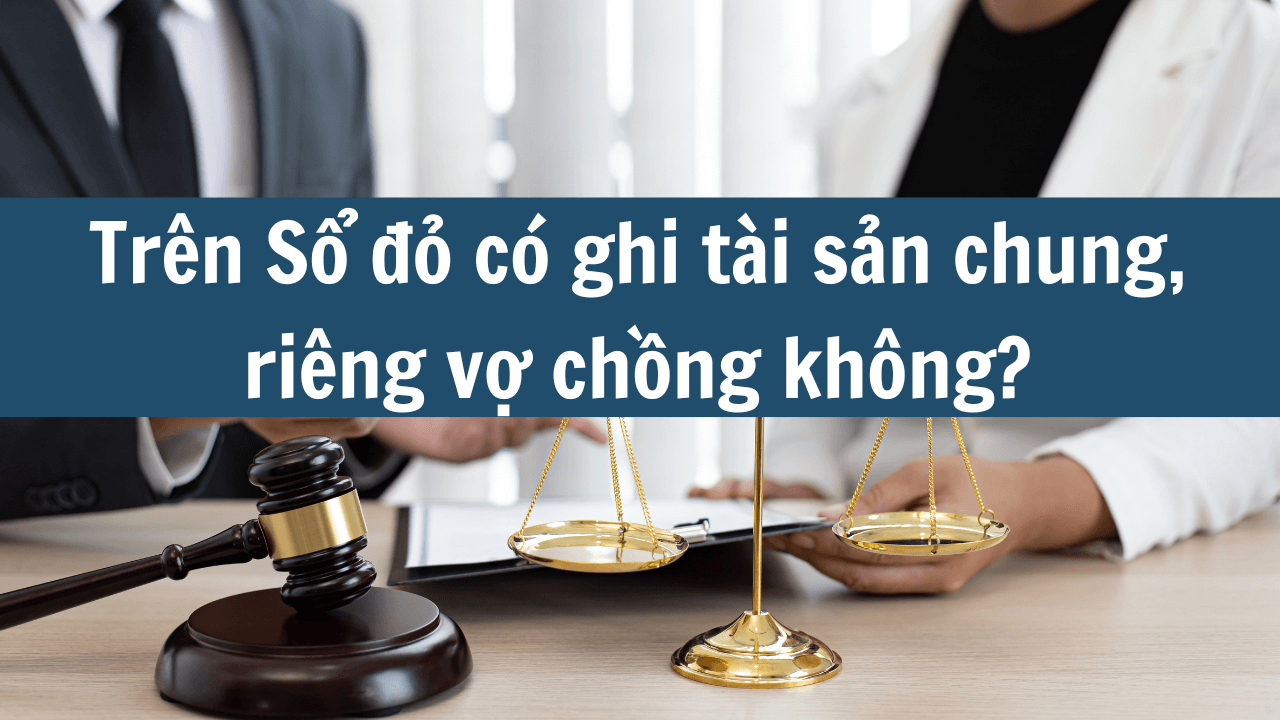
Trên Sổ đỏ có ghi tài sản chung, riêng vợ chồng không mới nhất 2025?
Sổ đỏ là giấy tờ pháp lý quan trọng xác định quyền sử dụng đất và quyền sở hữu tài sản gắn liền với đất. Tuy nhiên, nhiều người vẫn thắc mắc liệu trên Sổ đỏ có thể ghi rõ tài sản chung hay riêng của vợ chồng hay không. Bài viết này sẽ giải đáp chi tiết quy định pháp luật hiện hành về vấn đề này, giúp bạn hiểu rõ quyền lợi và trách nhiệm của mình. 31/12/2024Việc chiếm hữu, sử dụng, định đoạt tài chung của vợ chồng được quy định như thế nào mới nhất 2025?
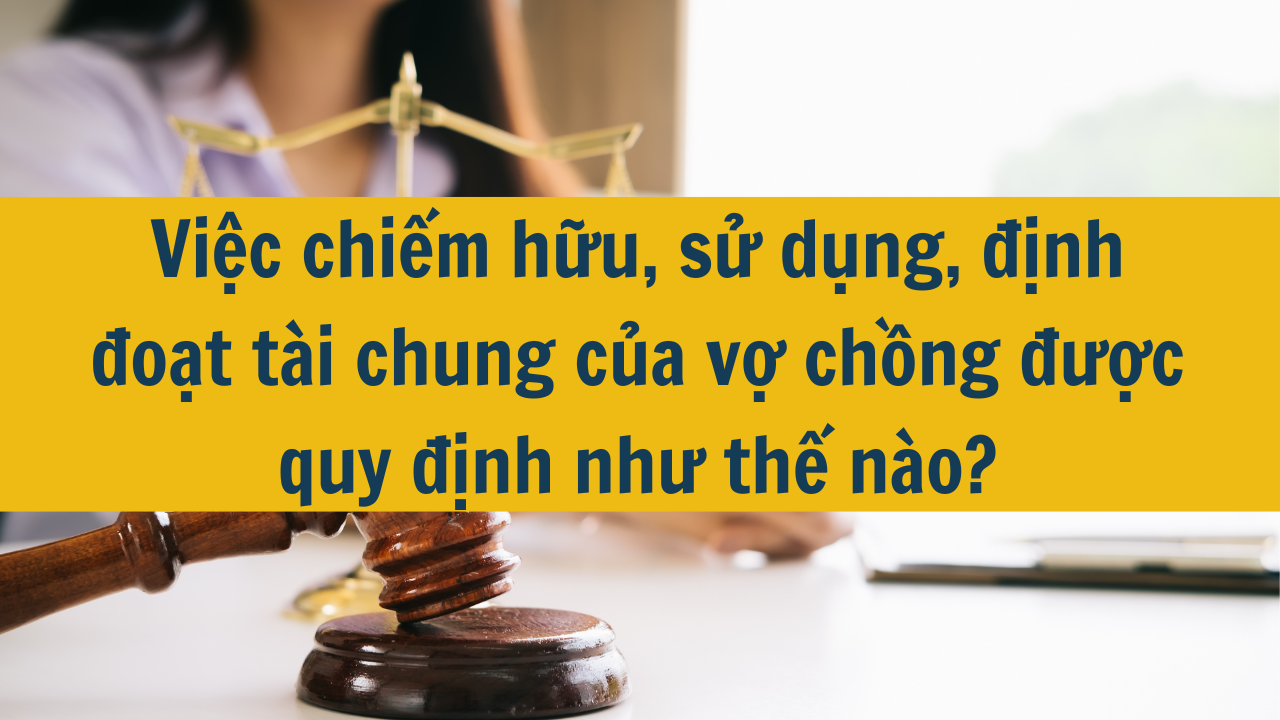
Việc chiếm hữu, sử dụng, định đoạt tài chung của vợ chồng được quy định như thế nào mới nhất 2025?
Tài sản chung của vợ chồng luôn là vấn đề pháp lý quan trọng trong hôn nhân và gia đình. Việc chiếm hữu, sử dụng, định đoạt tài sản chung không chỉ ảnh hưởng đến quyền lợi của mỗi bên mà còn đảm bảo tính minh bạch và công bằng trong mối quan hệ hôn nhân. Bài viết này sẽ phân tích chi tiết các quy định pháp luật về vấn đề này theo Luật Hôn nhân và Gia đình hiện hành. 31/12/2024Việc đăng ký quyền sở hữu, quyền sử dụng đối với tài sản chung của vợ chồng được quy định như thế nào mới nhất 2025?
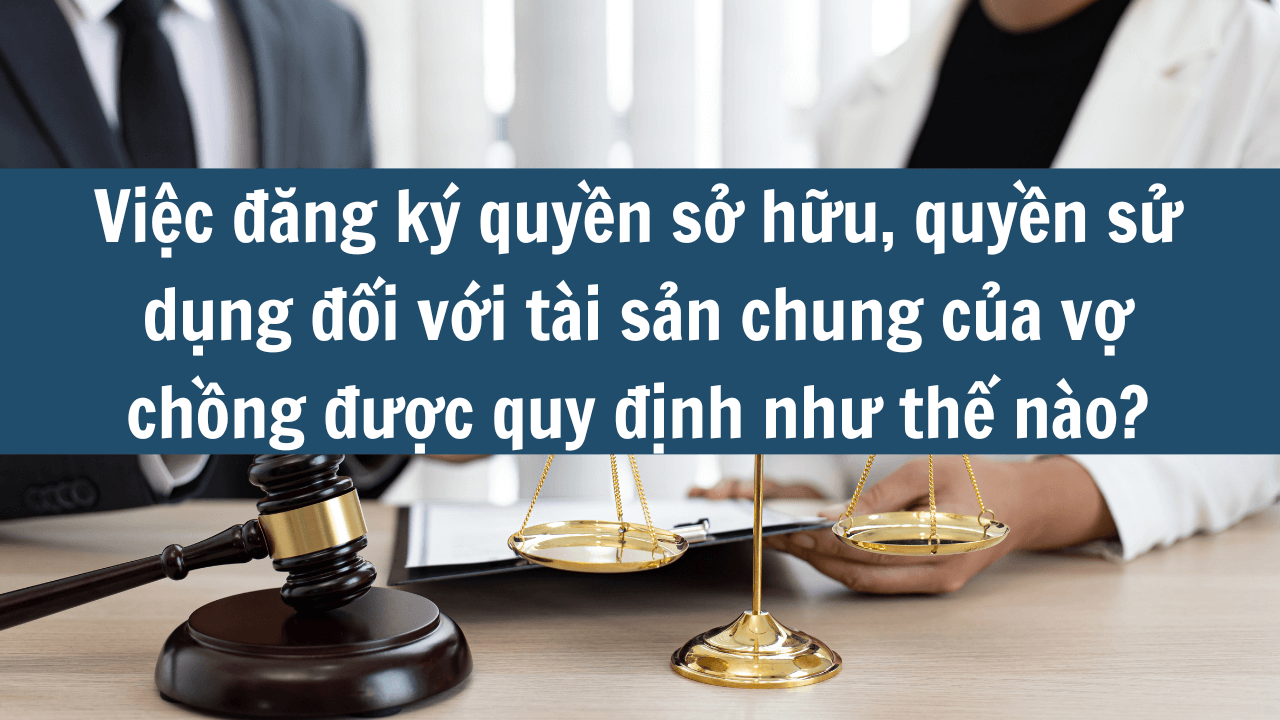
Việc đăng ký quyền sở hữu, quyền sử dụng đối với tài sản chung của vợ chồng được quy định như thế nào mới nhất 2025?
Việc đăng ký quyền sở hữu, quyền sử dụng đối với tài sản chung của vợ chồng là vấn đề pháp lý quan trọng, đảm bảo quyền lợi hợp pháp cho cả hai bên trong hôn nhân. Theo quy định pháp luật Việt Nam, quá trình này không chỉ bảo vệ quyền tài sản mà còn giảm thiểu tranh chấp về sau. Bài viết này sẽ phân tích chi tiết các quy định pháp luật hiện hành liên quan đến vấn đề này 31/12/2024Chế độ tài sản của vợ chồng phải tuân theo nguyên tắc nào mới nhất 2025?
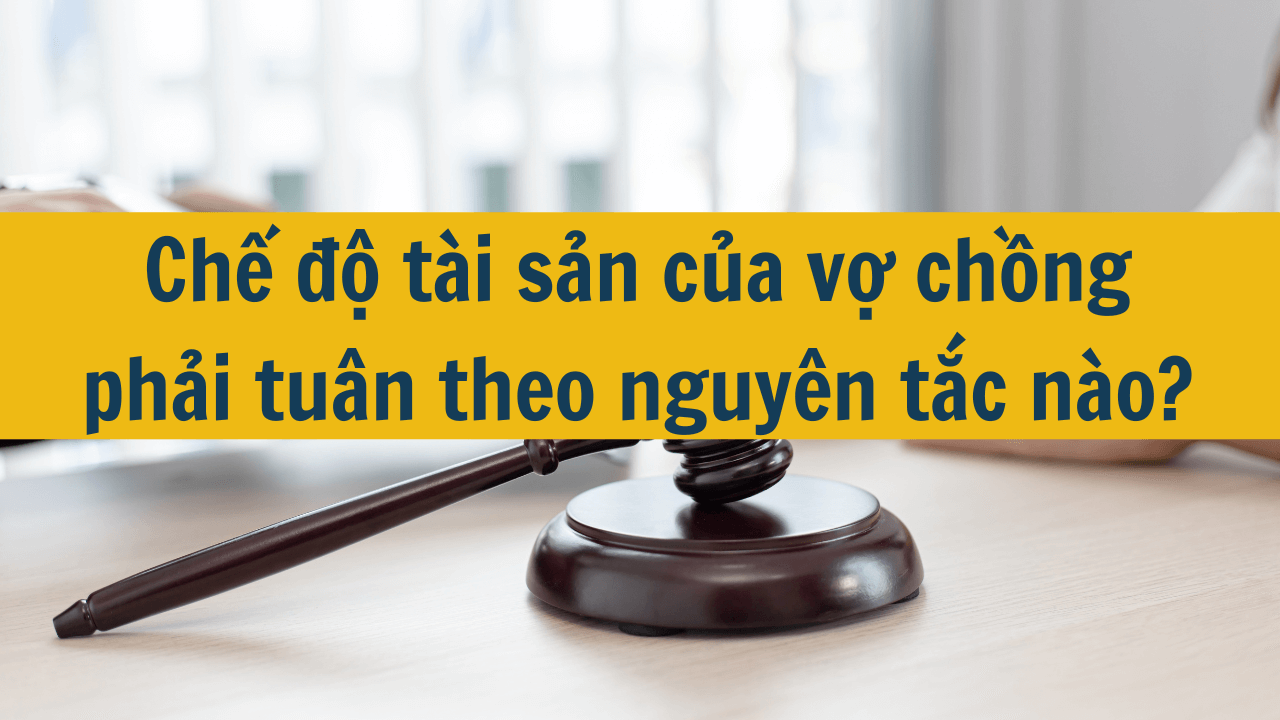
Chế độ tài sản của vợ chồng phải tuân theo nguyên tắc nào mới nhất 2025?
Chế độ tài sản của vợ chồng là nền tảng quan trọng để đảm bảo quyền và nghĩa vụ của mỗi bên trong hôn nhân. Vậy, những nguyên tắc pháp lý nào chi phối chế độ tài sản này? Bài viết sẽ làm rõ các quy định pháp luật hiện hành, giúp bạn hiểu rõ quyền lợi và trách nhiệm của mình trong quan hệ hôn nhân. 31/12/2024Những khoản nợ nào được chi trả bằng tài sản chung của vợ chồng mới nhất 2025?
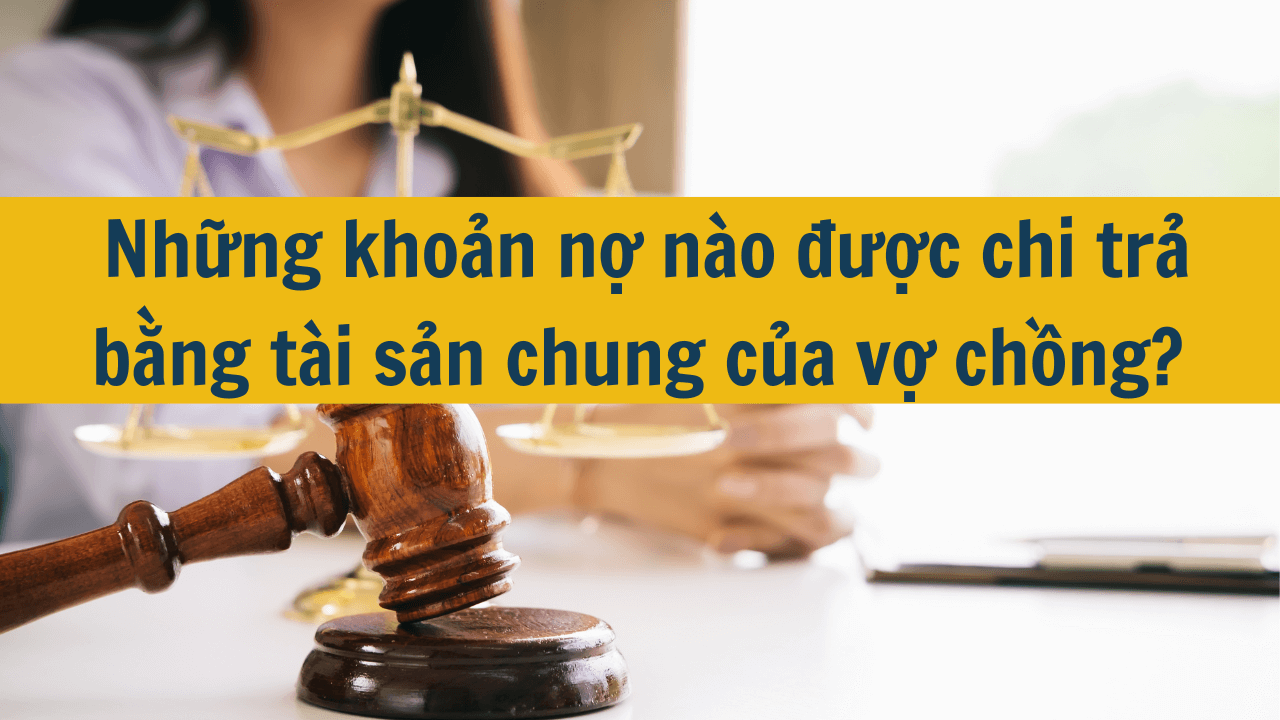
Những khoản nợ nào được chi trả bằng tài sản chung của vợ chồng mới nhất 2025?
Trong cuộc sống hôn nhân, vấn đề nợ chung và tài sản chung của vợ chồng luôn là chủ đề được quan tâm đặc biệt. Vậy, những khoản nợ nào sẽ được chi trả bằng tài sản chung? Cùng tìm hiểu rõ hơn qua bài viết dưới đây để hiểu đúng về quyền và nghĩa vụ của vợ chồng đối với các khoản nợ phát sinh trong thời kỳ hôn nhân! 31/12/2024Tài sản chung của vợ chồng bao gồm những tài sản nào mới nhất 2025?
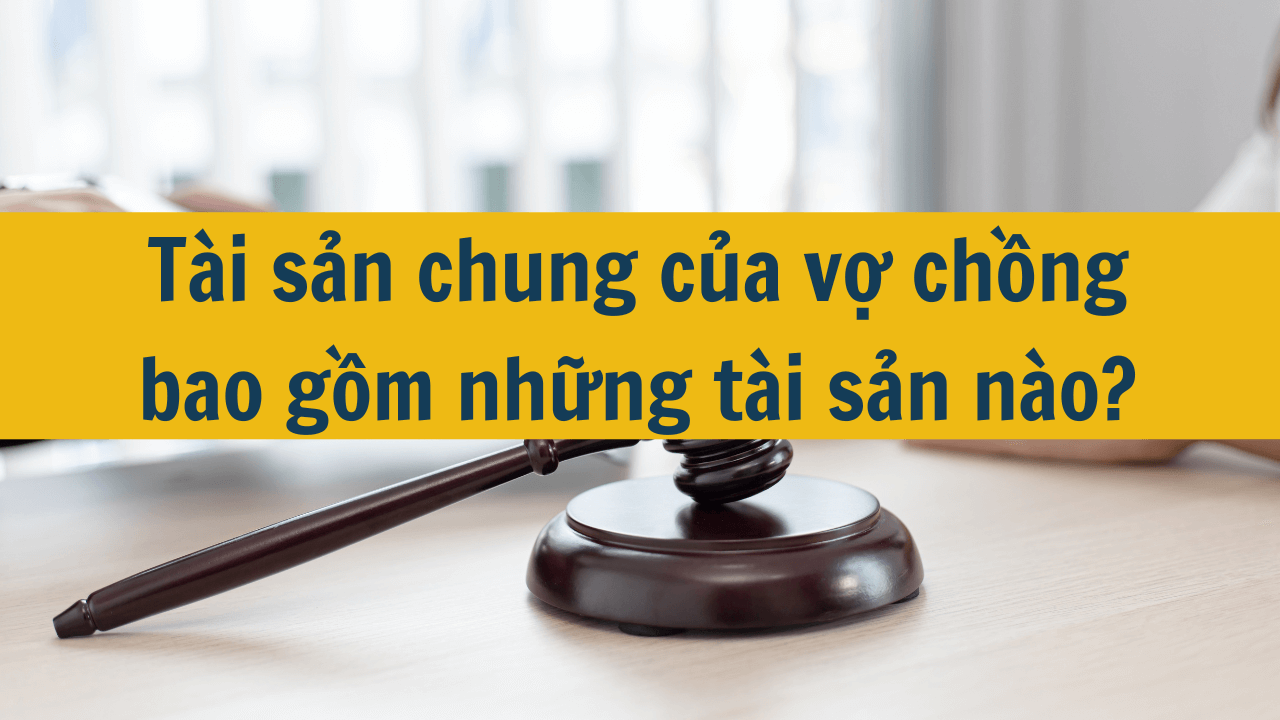
Tài sản chung của vợ chồng bao gồm những tài sản nào mới nhất 2025?
Tài sản chung của vợ chồng bao gồm những tài sản nào? Đây là câu hỏi phổ biến khi giải quyết các vấn đề pháp lý về hôn nhân và gia đình. Việc hiểu rõ tài sản nào được xem là tài sản chung giúp bảo vệ quyền lợi của cả hai bên trong quá trình chung sống hoặc khi xảy ra tranh chấp. Hãy cùng tìm hiểu chi tiết quy định pháp luật hiện hành về vấn đề này trong bài viết dưới đây! 31/12/2024Những trường hợp chia tài sản chung trong thời kỳ hôn nhân bị vô hiệu mới nhất 2025

Những trường hợp chia tài sản chung trong thời kỳ hôn nhân bị vô hiệu mới nhất 2025
Việc chia tài sản chung trong thời kỳ hôn nhân là vấn đề pháp lý nhạy cảm, đòi hỏi tuân thủ chặt chẽ các quy định pháp luật. Tuy nhiên, không phải mọi thỏa thuận chia tài sản đều hợp pháp. Bài viết này sẽ giúp bạn hiểu rõ các trường hợp chia tài sản chung bị vô hiệu, từ đó tránh những rủi ro pháp lý không đáng có. 31/12/2024Tài sản chung của vợ chồng là gì? Có được chia tài sản chung của vợ chồng trong thời kì hôn nhân hay không mới nhất 2025?
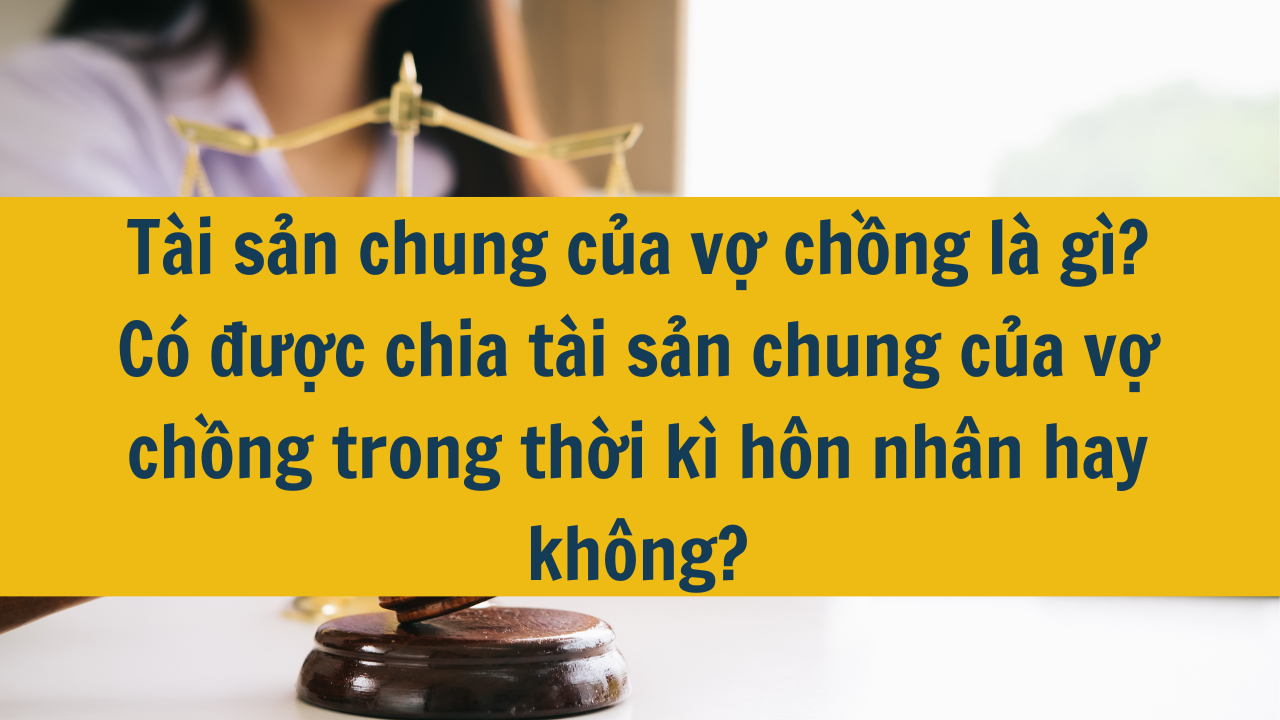

 Bộ luật Dân sự 2005 (Bản Word)
Bộ luật Dân sự 2005 (Bản Word)